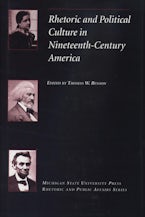The critical study of public address has changed in the twentieth century and will continue to evolve in the twenty-first. As the studies in this volume demonstrate, methodological pluralism is the standard of contemporary work, and active rhetorical critics today are more consciously aware of the theoretical implications and extensions of their work than were their critical forebears. What links the last with the present, however, and what will continue to engage us in the future, is the search for meaning in human rhetorical action.
The authors in this collection explore the claim that public discourse—spoken and written—continues to illustrate nineteenth-century American political culture. The book is a series of close textual readings of significant texts in American rhetoric, inquiring into the text, the context, the influence of pervasive rhetorical forms and genres, the intentions of the speaker, the response of the audience, and the role of the critic.
These spirited essays are concrete, committed, dialogic explorations of significant moments in American public discourse. That they do not reduce to a single voice or theory will be taken, it is hoped, as part of their virtue. A spirit of eager contestation and respect for intellectual diversity was a marked feature of the collection.
Each of the chapters treats, in some detail, issues relating to the theme of "time" in rhetorical practice and studies. Time appears as an issue here especially in considerations of the persistence of themes and forms; in recurrent attempts to transcend and re-shape public memory; in the choice of speakers and critics to celebrate, appropriate, revise, reframe, or reject earlier texts; and of course in the use of public oratory to influence the future.

